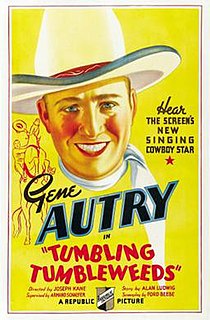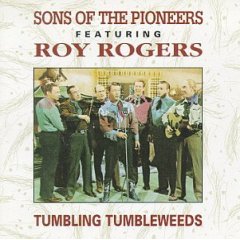
Orvon Grover "Gene" Autry, nicknamed the Singing Cowboy, was an American singer, songwriter, actor, musician, rodeo performer, and baseball owner who gained fame largely by singing in a crooning style on radio, in films, and on television for more than three decades beginning in the early 1930s. Autry was the owner of a television station, several radio stations in Southern California, and the Los Angeles/California Angels Major League Baseball team from 1961 to 1997.
"How High the Moon" is a jazz standard with lyrics by Nancy Hamilton and music by Morgan Lewis. It was first featured in the 1940 Broadway revue Two for the Show, where it was sung by Alfred Drake and Frances Comstock. In Two for the Show, this was a rare serious moment in an otherwise humorous revue.
"You Are My Sunshine" is a song copyrighted and published by Jimmie Davis and Charles Mitchell in 1940. According to BMI, it has been recorded by more than 350 artists, and translated into 30 languages. In 1977, the Louisiana State Legislature decreed that "You Are My Sunshine" would be a state song, to honor two-time governor Jimmie Davis.

"The Yellow Rose of Texas" is a traditional American folk song dating back to at least the 1850s. Members of the Western Writers of America chose it as one of the Top 100 Western songs of all time. Several versions of the song have been recorded, including by Elvis Presley, Willie Nelson and Mitch Miller.
"Have I Told You Lately That I Love You?" is a popular song written by Scotty Wiseman for the 1944 musical film, Sing, Neighbor, Sing and performed by Lulu Belle and Scotty. It was the greatest hit of Wiseman and his wife and one of the first country music songs to attract major attention in the pop music field. Its repeating fourth line is "Well darling, I'm telling you now." Although it was featured in the movie, it wasn't released by them until 1947. The first released version of this song was by Gene Autry in 1945.
"Pennies from Heaven" is a 1936 American popular song with music by Arthur Johnston and lyrics by Johnny Burke. It was introduced by Bing Crosby with Georgie Stoll and his Orchestra in the 1936 film of the same name.
"Imagination" is a popular song with music written by Jimmy Van Heusen and the lyrics by Johnny Burke. The song was first published in 1940. The two best-selling versions were recorded by the orchestras of Glenn Miller and Tommy Dorsey in 1940.
"Nice Work If You Can Get It" is a popular song and jazz standard composed by George Gershwin with lyrics by Ira Gershwin.

"The Nearness of You" is a popular song written in 1938 by Hoagy Carmichael with lyrics by Ned Washington. The song debuted in the 1938 movie Romance in the Dark.
"Let's Call the Whole Thing Off" is a song written by George Gershwin and Ira Gershwin for the 1937 film Shall We Dance, where it was introduced by Fred Astaire and Ginger Rogers as part of a celebrated dance duet on roller skates. The music sheet is annotated with the word "Brightly". The song was ranked No. 34 on AFI's 100 Years...100 Songs.

Public Cowboy #1 is a studio recording released on CD by the Western band Riders in the Sky on October 22, 1996.
"Can the Circle Be Unbroken " is the title of a country/folk song reworked by A. P. Carter from the hymn "Will the Circle Be Unbroken?" by Ada R. Habershon and Charles H. Gabriel. The song's lyrics concern the death, funeral, and mourning of the narrator's mother.
"Back in the Saddle Again" was the signature song of American cowboy entertainer Gene Autry. It was co-written by Autry with Ray Whitley and first released in 1939. The song was associated with Autry throughout his career and was used as the name of Autry's autobiography in 1976. Members of the Western Writers of America chose it as fifth of the Top 100 Western songs of all time.
"I Can't Be Bothered Now" is a song composed by George Gershwin, with lyrics by Ira Gershwin, written for the 1937 film A Damsel In Distress, where it was introduced by Fred Astaire.
Jimmy Campbell and Reg Connelly were English songwriters and music publishers. Writing together in the 1920s and 1930s, they sometimes used the pseudonym Irving King for their song compositions, and often worked as lyricists in collaboration with other composers. Together, they established the successful music publishing firm Campbell Connelly.
"Change Partners" is a popular song written by Irving Berlin for the 1938 film Carefree, where it was introduced by Fred Astaire. The song was nominated for an Academy Award for Best Original Song in 1938 but lost out to "Thanks for the Memory."

"Mexicali Rose" is a popular song with music by Jack Tenney and lyrics by Helen Stone, published in 1923. The song is a love story of a man who must leave his love for a while. The chorus:

Tumbling Tumbleweeds is a 1935 American Western film directed by Joseph Kane and starring Gene Autry, Smiley Burnette, and Lucile Browne. Written by Ford Beebe, the film is about a cowboy who returns home after a five-year absence to find his father murdered and his boyhood pal accused of the dastardly deed. Tumbling Tumbleweeds features the songs "Riding Down the Canyon", "That Silver-Haired Daddy of Mine", and the Bob Nolan classic "Tumbling Tumbleweeds".

"Tumbling Tumbleweeds" is a song composed by Bob Nolan. Although one of the most famous songs associated with the Sons of the Pioneers, the song was composed by Nolan in the 1930s, while working as a caddy and living in Los Angeles. Originally titled "Tumbling Leaves," the song was reworked into the title "Tumbling Tumbleweeds" and into fame with the 1935 Gene Autry film of the same name. Members of the Western Writers of America chose it as one of the Top 100 Western songs of all time.
"Make Love to Me" is a 1954 popular song with words and music written by a larger team than normally is known to collaborate on a song: Bill Norvas, Alan Copeland, and the New Orleans Rhythm Kings, comprising Leon Rappolo, Paul Mares, Ben Pollack, George Brunies, Mel Stitzel, and Walter Melrose. The melody was derived from a 1923 song, "Tin Roof Blues", composed by the New Orleans Rhythm Kings.







